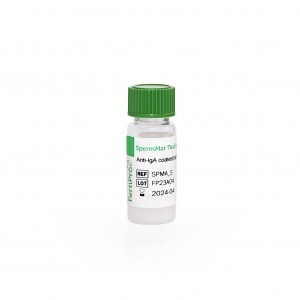SpermMar Test IgA
Test for the detection of anti-sperm antibodies
As sperm does not come into contact with the blood circulation, the male reproductive system contains no antisperm antibodies in normal conditions. However, when the blood-testis barrier is breached, the immune system can detect mature sperm as antigenic and form antisperm antibodies that cause sub- or infertility. Antisperm antibodies belong to two immunological classes: immunoglobulin (Ig)A and IgG antibodies. Antisperm IgA antibodies are clinically associated with immunological infertility, and screening can therefore provide help in assessing the male fertility.
The SpermMar Test IgA is a semi-quantitative, non-automated, diagnostic kit for detecting antisperm antibodies of the IgA class on spermatozoa in human semen. It is a rapid, easy-to-use microscopic test.
The SpermMar Test IgA can be performed on fresh, untreated human semen provided that it contains motile spermatozoa. The SpermMar Test IgA can be used as an aid in the diagnosis and management of male infertility.
SpermMar Test IgA has a 12 month shelf life from production date. Information about the composition of the product can be found in the material safety data sheet.
Regulatory information
Europe: CE-marked (IVDR, Notified Body number 2797)
USA: registered – Canada: Health Canada licence
Brazil: registered – Australia: registered
Other regions: information available upon request
Product order codes
SPMA_S : SpermMar Test IgA – Single kit – 50 tests
SPMA_C : SpermMar Test IgA – Complete kit – 50 tests

